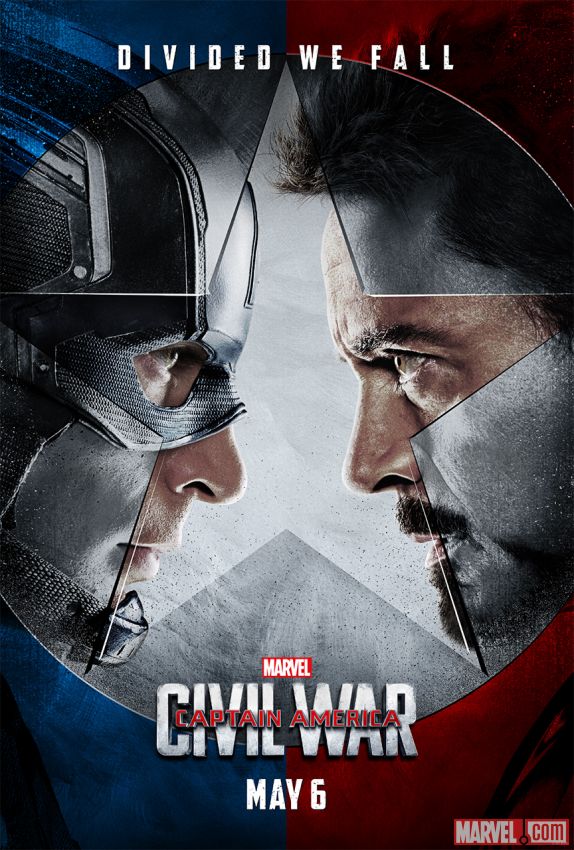Marvel delivers again with another powerful ensemble performance
I have seen nearly all of the MCU movies, and enjoyed them so last night the family went to see Captain America: Civil War. Right away I can say I enjoyed it. This film has everything - action, suspense, surprise, humor, sadness, tragedy and does not ever descend into message fic while presenting Big Questions. I did not leave the theater happy, but I was satisfied.
Civil War and its titular predecessor, The Winter Soldier have the most realism of any 'superhero' movies I've seen, if one can use the term realism when talking about persons who fly and shoot lasers out of their hands/eyes/heads. Best quotable of the film:
"That thing doesn't obey the laws of physics at all."
One major theme of this file is the intense personal cost of the superhero life. I've watched Marvel and DC cartoons on Netflix, with these same characters and it is much different. Routinely in superhero dust-ups, people who are not known for being 'armored' are punched, kicked, or exploded through walls, trees, windows, cars (how many cars has Captain America landed on in the films?) and buildings. Typically, the cartoon hero or villain just gets up and 'walks it off'. In Civil War, we see how more of how it can hurt. Bruises and blood and black eyes abound. One hero takes a far worse hit; he'll live but his world has been changed dramatically. It is a shocking and sobering moment.
There's an emotional cost as well. Cap, Iron Man, Scarlet Witch and Winter Soldier all are confronted (haunted) by the human cost of their actions. Several are blamed for the deaths of bystanders to the battles they've fought. Not all of them deal with it well. In fact, the choice of how to deal with the weight of responsibility is the driver behind the plot point that splits up the team. They can't save everybody, although they try. I found the film's treatment of this particular point heavy-handed and lopsided towards the "make the heroes feel guilty" side. If it were not, then perhaps we would not have the film's central conflict, so we'll put up with it. But it still comes off as unfair.
I suppose that real life rescue workers have to deal with this as well; "Could I have done more? Am I responsible for those who died, those I tried but could not save?" I have not ever been in that situation, but from here on the couch I say NO to the people who heap guilt and place blame on Captain America and his crew. Loki & the Chitauri blew up New York, Ultron tried to break the world but only blew up Sokovia; the first-act villain in Civil War caused the international incident which set off the film's plot. In all three cases the Avengers were trying to stop greater destruction. They did not 'save everyone' (although they did an amazing job in Sokovia) but had they not been there, the death toll and destruction would have been unimaginably worse.
President Theodore Roosevelt is sometimes depicted as a figure of superhero proportions. I don't know about that, but listen to what he did say about those who tries his hardest to do the right thing:
“It is not the critic who counts; not the man who points out how the strong man stumbles, or where the doer of deeds could have done them better. The credit belongs to the man who is actually in the arena, whose face is marred by dust and sweat and blood; who strives valiantly; who errs, who comes short again and again, because there is no effort without error and shortcoming; but who does actually strive to do the deeds; who knows great enthusiasms, the great devotions; who spends himself in a worthy cause; who at the best knows in the end the triumph of high achievement, and who at the worst, if he fails, at least fails while daring greatly, so that his place shall never be with those cold and timid souls who neither know victory nor defeat.”
 |
| Do not mess with this man. And don't call him Teddy. |
Revenge is the other emotional theme, and what it costs. Several characters in this film express a desire for revenge, all for the same reason - the loss of loved ones. Revenge is a powerful emotion and like any emotion, when it gets out of control, it brings destruction, or as the Vision put is, "catastrophe". You can even call guilt 'revenge that you take on yourself'. Near the climax, one of the heroes sees the impending doom his drive for revenge is leading him towards. I hoped that I would see this character intervene to stop the other revenge-driven characters.
Love, hope, revenge, fear; all of these are familiar to us normal people, they are what lets us relate to the super-powerful types jumping around the screen. Maybe by watching how they respond to fear, guilt and revenge we can ask ourselves what we will do when we are confronted with them, which in this life we most certainly will be. I won't destroy the world if I am driven by revenge, but I can still cause pain to those around me.
Go see this movie. Avoid the silly arguments about "Team Cap" or "Team Iron Man" and instead discuss how to make the hard choices that life presents to us.


1 comment:
This was excellent. Thank you for your words, they eased my heart about the in-fighting of the superheroes! I hate that!
Post a Comment